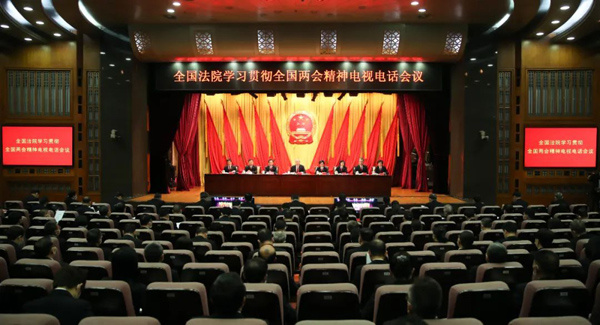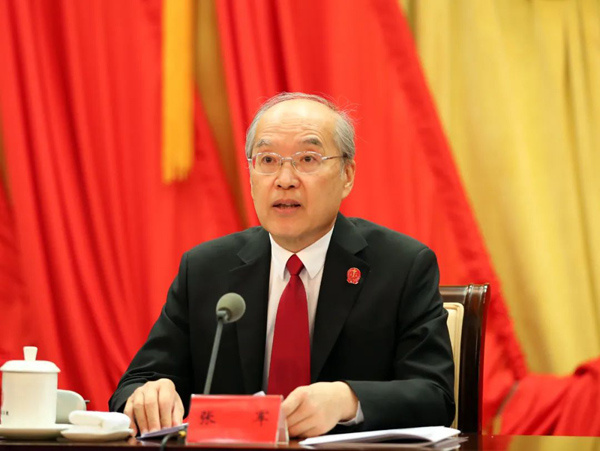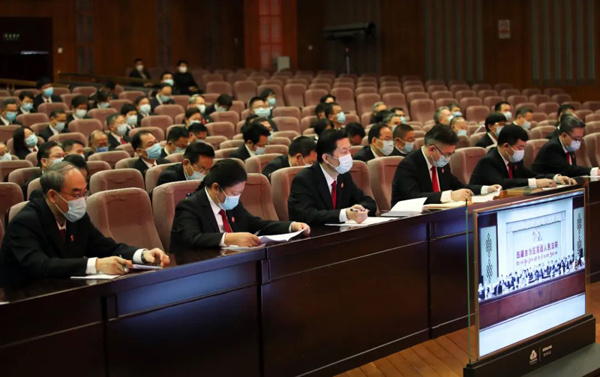Teleconference on learning guiding principles of two sessions held among courts nationwide


Zhang Jun, president of the Supreme People's Court, attends and addresses the teleconference on learning the key speeches and guiding principles of this year's two sessions among courts nationwide, held on March 23, 2023. [Photo/court.gov.cn]
A teleconference on learning the key speeches and guiding principles of this year's two sessions among courts nationwide was held on March 23. Zhang Jun, president of the Supreme People's Court (SPC), attended and addressed the conference.
It was pointed out at the conference that this year's two sessions are of great significance as they were held in the first year of implementing the guiding principles of the 20th National Congress of the Communist Party of China. Courts across the nation were instructed to refer to the resolution on the work report of the SPC and suggestions put forward by deputies to the National People's Congress (NPC) and members of the National Committee of the Chinese People's Political Consultative Conference (CPPCC), to do a solid job in serving the overall development of the country and safeguarding justice for the people, and to promote innovation among courts, so as to serve the Chinese path to modernization through the modernization of trial work.

Judicial staff of the Supreme People's Court attend the teleconference on learning the key speeches and guiding principles of this year's two sessions at the main venue on March 23, 2023. [Photo/court.gov.cn]
At the conference, Zhang raised requirements in three aspects: to be politically aware of the overall situation, to promote fairness and improve efficiency, and to emphasize self-discipline and strengthen team-building.
Specifically, to grasp and implement the spirit of the two sessions is a major testimony of being politically aware of the overall situation. Efforts are needed to solve prominent problems that are often taken for granted, to better coordinate development and security, and strive to promote high-quality development with high-quality justice, according to Zhang. Regarding optimizing the legal environment for the development of the private economy, which attracted much attention at this year's two sessions, Zhang proposed working with the procuratorial organs to carry out the compliance reform in enterprises involving malpractice, and making full use of the third-party compliance supervision mechanism established by local authorities to guide private enterprises to operate in good faith and abide by the law. As for cases related to people's livelihoods, Zhang urged for full commitment in opening up channels to meet people's needs, and focusing on resolving difficult issues in such procedures as case-filing, litigation, enforcement and petitioning.
As for promoting fairness and improving efficiency, Zhang urged to take into account political, social and legal effects in judicial practice, to attach more importance to explaining the law and reasoning, to solve problems substantively, and to ensure that judicial decisions reflect the common and simple feelings of the people. Efforts are needed on litigation-source governance and to proactively integrate it into the governance of the State and the society, Zhang stressed, adding that it is necessary to not only handle each case well, but also identify the causes of individual and similar cases, and proactively propose judicial suggestions to relevant departments in order to fundamentally reduce the occurrence of cases.
The key to building a self-disciplined and strong team lies in strengthening political integrity, professional competence and ethics, which are inter-connected, according to Zhang. He called on all judicial staff to be sensitive to their own weaknesses, carry out studies and research, and persist in learning by working and vice versa.
The meeting also made clear requirements for the SPC and local courts in clearing backlogged cases and effectively solving the problem of not accepting cases at the end of the year, studying plans for a new round of court reform, and strengthening judicial management.









